标签:
一、为什么需要代理模式
假设需实现一个计算的类Math、完成加、减、乘、除功能,如下所示:
1 package com.zhangguo.Spring041.aop01; 2 3 public class Math { 4 //加 5 public int add(int n1,int n2){ 6 int result=n1+n2; 7 System.out.println(n1+"+"+n2+"="+result); 8 return result; 9 } 10 11 12 //减 13 public int sub(int n1,int n2){ 14 int result=n1-n2; 15 System.out.println(n1+"-"+n2+"="+result); 16 return result; 17 } 18 19 //乘 20 public int mut(int n1,int n2){ 21 int result=n1*n2; 22 System.out.println(n1+"X"+n2+"="+result); 23 return result; 24 } 25 26 //除 27 public int div(int n1,int n2){ 28 int result=n1/n2; 29 System.out.println(n1+"/"+n2+"="+result); 30 return result; 31 } 32 }
现在需求发生了变化,要求项目中所有的类在执行方法时输出执行耗时。最直接的办法是修改源代码,如下所示:
1 package com.zhangguo.Spring041.aop01; 2 3 import java.util.Random; 4 5 public class Math { 6 //加 7 public int add(int n1,int n2){ 8 //开始时间 9 long start=System.currentTimeMillis(); 10 lazy(); 11 int result=n1+n2; 12 System.out.println(n1+"+"+n2+"="+result); 13 Long span= System.currentTimeMillis()-start; 14 System.out.println("共用时:"+span); 15 return result; 16 } 17 18 //减 19 public int sub(int n1,int n2){ 20 //开始时间 21 long start=System.currentTimeMillis(); 22 lazy(); 23 int result=n1-n2; 24 System.out.println(n1+"-"+n2+"="+result); 25 Long span= System.currentTimeMillis()-start; 26 System.out.println("共用时:"+span); 27 return result; 28 } 29 30 //乘 31 public int mut(int n1,int n2){ 32 //开始时间 33 long start=System.currentTimeMillis(); 34 lazy(); 35 int result=n1*n2; 36 System.out.println(n1+"X"+n2+"="+result); 37 Long span= System.currentTimeMillis()-start; 38 System.out.println("共用时:"+span); 39 return result; 40 } 41 42 //除 43 public int div(int n1,int n2){ 44 //开始时间 45 long start=System.currentTimeMillis(); 46 lazy(); 47 int result=n1/n2; 48 System.out.println(n1+"/"+n2+"="+result); 49 Long span= System.currentTimeMillis()-start; 50 System.out.println("共用时:"+span); 51 return result; 52 } 53 54 //模拟延时 55 public void lazy() 56 { 57 try { 58 int n=(int)new Random().nextInt(500); 59 Thread.sleep(n); 60 } catch (InterruptedException e) { 61 e.printStackTrace(); 62 } 63 } 64 }
测试运行:
package com.zhangguo.Spring041.aop01; public class Test { @org.junit.Test public void test01() { Math math=new Math(); int n1=100,n2=5; math.add(n1, n2); math.sub(n1, n2); math.mut(n1, n2); math.div(n1, n2); } }
运行结果:
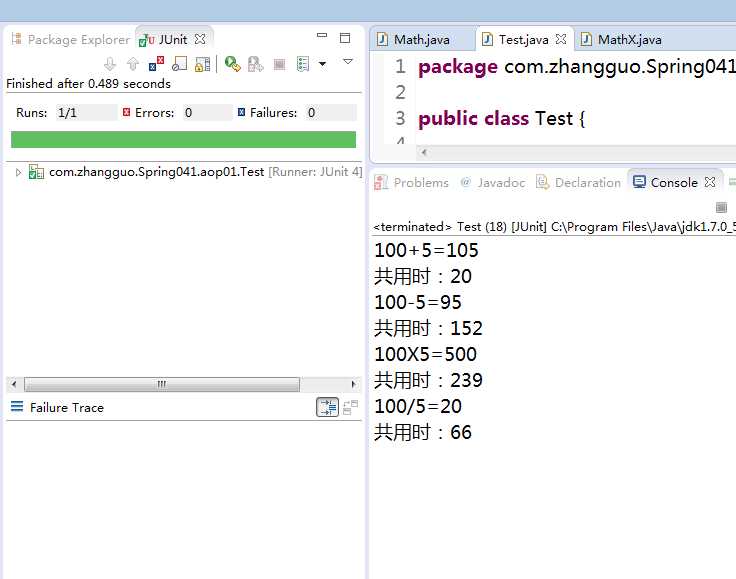
缺点:
1、工作量特别大,如果项目中有多个类,多个方法,则要修改多次。
2、违背了设计原则:开闭原则(OCP),对扩展开放,对修改关闭,而为了增加功能把每个方法都修改了,也不便于维护。
3、违背了设计原则:单一职责(SRP),每个方法除了要完成自己本身的功能,还要计算耗时、延时;每一个方法引起它变化的原因就有多种。
4、违背了设计原则:依赖倒转(DIP),抽象不应该依赖细节,两者都应该依赖抽象。而在Test类中,Test与Math都是细节。
使用静态代理可以解决部分问题。
二、静态代理
1、定义抽象主题接口。
package com.zhangguo.Spring041.aop02; /** * 接口 * 抽象主题 */ public interface IMath { //加 int add(int n1, int n2); //减 int sub(int n1, int n2); //乘 int mut(int n1, int n2); //除 int div(int n1, int n2); }
2、主题类,算术类,实现抽象接口。
package com.zhangguo.Spring041.aop02; /** * 被代理的目标对象 *真实主题 */ public class Math implements IMath { //加 public int add(int n1,int n2){ int result=n1+n2; System.out.println(n1+"+"+n2+"="+result); return result; } //减 public int sub(int n1,int n2){ int result=n1-n2; System.out.println(n1+"-"+n2+"="+result); return result; } //乘 public int mut(int n1,int n2){ int result=n1*n2; System.out.println(n1+"X"+n2+"="+result); return result; } //除 public int div(int n1,int n2){ int result=n1/n2; System.out.println(n1+"/"+n2+"="+result); return result; } }
3、代理类
1 package com.zhangguo.Spring041.aop02; 2 3 import java.util.Random; 4 5 /** 6 * 静态代理类 7 */ 8 public class MathProxy implements IMath { 9 10 //被代理的对象 11 IMath math=new Math(); 12 13 //加 14 public int add(int n1, int n2) { 15 //开始时间 16 long start=System.currentTimeMillis(); 17 lazy(); 18 int result=math.add(n1, n2); 19 Long span= System.currentTimeMillis()-start; 20 System.out.println("共用时:"+span); 21 return result; 22 } 23 24 //减法 25 public int sub(int n1, int n2) { 26 //开始时间 27 long start=System.currentTimeMillis(); 28 lazy(); 29 int result=math.sub(n1, n2); 30 Long span= System.currentTimeMillis()-start; 31 System.out.println("共用时:"+span); 32 return result; 33 } 34 35 //乘 36 public int mut(int n1, int n2) { 37 //开始时间 38 long start=System.currentTimeMillis(); 39 lazy(); 40 int result=math.mut(n1, n2); 41 Long span= System.currentTimeMillis()-start; 42 System.out.println("共用时:"+span); 43 return result; 44 } 45 46 //除 47 public int div(int n1, int n2) { 48 //开始时间 49 long start=System.currentTimeMillis(); 50 lazy(); 51 int result=math.div(n1, n2); 52 Long span= System.currentTimeMillis()-start; 53 System.out.println("共用时:"+span); 54 return result; 55 } 56 57 //模拟延时 58 public void lazy() 59 { 60 try { 61 int n=(int)new Random().nextInt(500); 62 Thread.sleep(n); 63 } catch (InterruptedException e) { 64 e.printStackTrace(); 65 } 66 } 67 }
4、测试运行
1 package com.zhangguo.Spring041.aop02; 2 3 public class Test { 4 5 IMath math=new MathProxy(); 6 @org.junit.Test 7 public void test01() 8 { 9 int n1=100,n2=5; 10 math.add(n1, n2); 11 math.sub(n1, n2); 12 math.mut(n1, n2); 13 math.div(n1, n2); 14 } 15 }
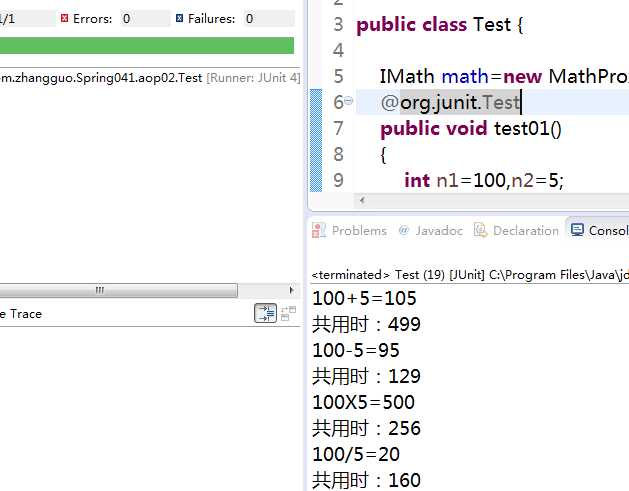
5、小节
通过静态代理,是否完全解决了上述的4个问题:
已解决:
5.1、解决了“开闭原则(OCP)”的问题,因为并没有修改Math类,而扩展出了MathProxy类。
5.2、解决了“依赖倒转(DIP)”的问题,通过引入接口。
5.3、解决了“单一职责(SRP)”的问题,Math类不再需要去计算耗时与延时操作,但从某些方面讲MathProxy还是存在该问题。
未解决:
5.4、如果项目中有多个类,则需要编写多个代理类,工作量大,不好修改,不好维护,不能应对变化。
如果要解决上面的问题,可以使用动态代理。
三、动态代理,使用JDK内置的Proxy实现
只需要一个代理类,而不是针对每个类编写代理类。
在上一个示例中修改代理类MathProxy如下:
1 package com.zhangguo.Spring041.aop03; 2 3 import java.lang.reflect.InvocationHandler; 4 import java.lang.reflect.Method; 5 import java.lang.reflect.Proxy; 6 import java.util.Random; 7 8 /** 9 * 动态代理类 10 */ 11 public class DynamicProxy implements InvocationHandler { 12 13 //被代理的对象 14 Object targetObject; 15 16 /** 17 * 获得被代理后的对象 18 * @param object 被代理的对象 19 * @return 代理后的对象 20 */ 21 public Object getProxyObject(Object object){ 22 this.targetObject=object; 23 return Proxy.newProxyInstance( 24 targetObject.getClass().getClassLoader(), //类加载器 25 targetObject.getClass().getInterfaces(), //获得被代理对象的所有接口 26 this); //InvocationHandler对象 27 //loader:一个ClassLoader对象,定义了由哪个ClassLoader对象来生成代理对象进行加载 28 //interfaces:一个Interface对象的数组,表示的是我将要给我需要代理的对象提供一组什么接口,如果我提供了一组接口给它,那么这个代理对象就宣称实现了该接口(多态),这样我就能调用这组接口中的方法了 29 //h:一个InvocationHandler对象,表示的是当我这个动态代理对象在调用方法的时候,会关联到哪一个InvocationHandler对象上,间接通过invoke来执行 30 } 31 32 33 /** 34 * 当用户调用对象中的每个方法时都通过下面的方法执行,方法必须在接口 35 * proxy 被代理后的对象 36 * method 将要被执行的方法信息(反射) 37 * args 执行方法时需要的参数 38 */ 39 public Object invoke(Object proxy, Method method, Object[] args) throws Throwable { 40 //被织入的内容,开始时间 41 long start=System.currentTimeMillis(); 42 lazy(); 43 44 //使用反射在目标对象上调用方法并传入参数 45 Object result=method.invoke(targetObject, args); 46 47 //被织入的内容,结束时间 48 Long span= System.currentTimeMillis()-start; 49 System.out.println("共用时:"+span); 50 51 return result; 52 } 53 54 //模拟延时 55 public void lazy() 56 { 57 try { 58 int n=(int)new Random().nextInt(500); 59 Thread.sleep(n); 60 } catch (InterruptedException e) { 61 e.printStackTrace(); 62 } 63 } 64 65 }
测试运行:
1 package com.zhangguo.Spring041.aop03; 2 3 public class Test { 4 5 //实例化一个MathProxy代理对象 6 //通过getProxyObject方法获得被代理后的对象 7 IMath math=(IMath)new DynamicProxy().getProxyObject(new Math()); 8 @org.junit.Test 9 public void test01() 10 { 11 int n1=100,n2=5; 12 math.add(n1, n2); 13 math.sub(n1, n2); 14 math.mut(n1, n2); 15 math.div(n1, n2); 16 } 17 18 IMessage message=(IMessage) new DynamicProxy().getProxyObject(new Message()); 19 @org.junit.Test 20 public void test02() 21 { 22 message.message(); 23 } 24 }
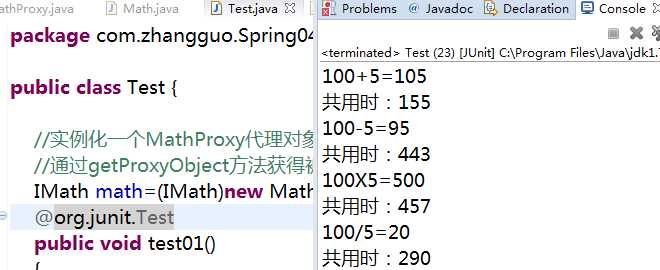
小结:
JDK内置的Proxy动态代理可以在运行时动态生成字节码,而没必要针对每个类编写代理类。中间主要使用到了一个接口InvocationHandler与Proxy.newProxyInstance静态方法,参数说明如下:
使用内置的Proxy实现动态代理有一个问题:被代理的类必须实现接口,未实现接口则没办法完成动态代理。
如果项目中有些类没有实现接口,则不应该为了实现动态代理而刻意去抽出一些没有实例意义的接口,通过cglib可以解决该问题。
四、动态代理,使用cglib实现
CGLIB(Code Generation Library)是一个开源项目,是一个强大的,高性能,高质量的Code生成类库,它可以在运行期扩展Java类与实现Java接口,通俗说cglib可以在运行时动态生成字节码。
4.1、引用cglib,通过maven

修改pom.xml文件,添加依赖

保存pom.xml配置文件,将自动从共享资源库下载cglib所依赖的jar包,主要有如下几个:

4.2、使用cglib完成动态代理,大概的原理是:cglib继承被代理的类,重写方法,织入通知,动态生成字节码并运行,因为是继承所以final类是没有办法动态代理的。具体实现如下:
1 package com.zhangguo.Spring041.aop04; 2 3 import java.lang.reflect.Method; 4 import java.util.Random; 5 6 import net.sf.cglib.proxy.Enhancer; 7 import net.sf.cglib.proxy.MethodInterceptor; 8 import net.sf.cglib.proxy.MethodProxy; 9 10 /* 11 * 动态代理类 12 * 实现了一个方法拦截器接口 13 */ 14 public class DynamicProxy implements MethodInterceptor { 15 16 // 被代理对象 17 Object targetObject; 18 19 //Generate a new class if necessary and uses the specified callbacks (if any) to create a new object instance. 20 //Uses the no-arg constructor of the superclass. 21 //动态生成一个新的类,使用父类的无参构造方法创建一个指定了特定回调的代理实例 22 public Object getProxyObject(Object object) { 23 this.targetObject = object; 24 //增强器,动态代码生成器 25 Enhancer enhancer=new Enhancer(); 26 //回调方法 27 enhancer.setCallback(this); 28 //设置生成类的父类类型 29 enhancer.setSuperclass(targetObject.getClass()); 30 //动态生成字节码并返回代理对象 31 return enhancer.create(); 32 } 33 34 // 拦截方法 35 public Object intercept(Object object, Method method, Object[] args, MethodProxy methodProxy) throws Throwable { 36 // 被织入的横切内容,开始时间 before 37 long start = System.currentTimeMillis(); 38 lazy(); 39 40 // 调用方法 41 Object result = methodProxy.invoke(targetObject, args); 42 43 // 被织入的横切内容,结束时间 44 Long span = System.currentTimeMillis() - start; 45 System.out.println("共用时:" + span); 46 47 return result; 48 } 49 50 // 模拟延时 51 public void lazy() { 52 try { 53 int n = (int) new Random().nextInt(500); 54 Thread.sleep(n); 55 } catch (InterruptedException e) { 56 e.printStackTrace(); 57 } 58 } 59 60 }
测试运行:
package com.zhangguo.Spring041.aop04; public class Test { //实例化一个DynamicProxy代理对象 //通过getProxyObject方法获得被代理后的对象 Math math=(Math)new DynamicProxy().getProxyObject(new Math()); @org.junit.Test public void test01() { int n1=100,n2=5; math.add(n1, n2); math.sub(n1, n2); math.mut(n1, n2); math.div(n1, n2); } //另一个被代理的对象,不再需要重新编辑代理代码 Message message=(Message) new DynamicProxy().getProxyObject(new Message()); @org.junit.Test public void test02() { message.message(); } }
运行结果:
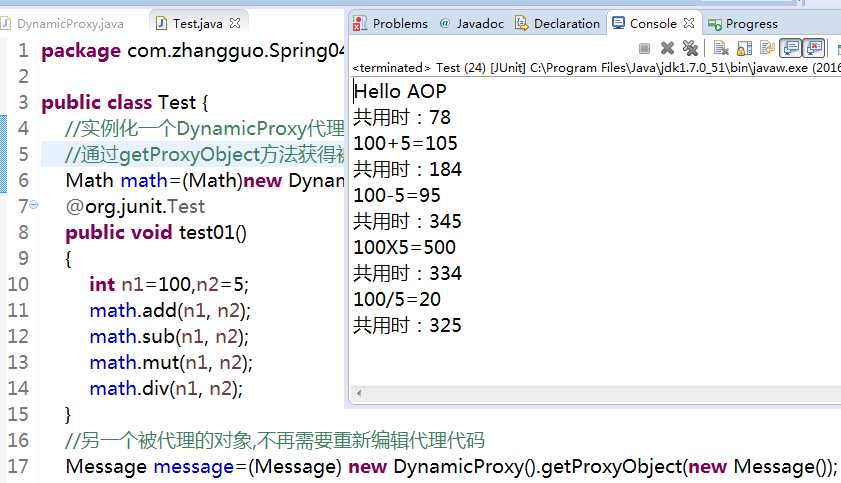
4.3、小结
使用cglib可以实现动态代理,即使被代理的类没有实现接口,但被代理的类必须不是final类。
五、使用Spring实现AOP
SpringAOP中,通过Advice定义横切逻辑,Spring中支持5种类型的Advice:
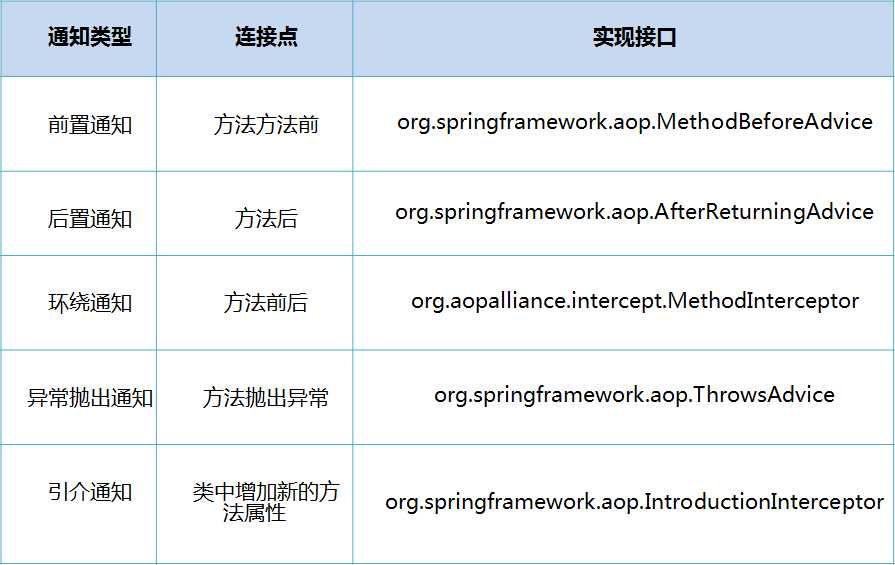
5.1、新建 一个Maven项目,在项目中引入Spring核心库与AOP,修改pom.xml文件,在dependencies中增加如下节点:
<dependency> <groupId>org.springframework</groupId> <artifactId>spring-context</artifactId> <version>4.3.0.RELEASE</version> </dependency>
当保存pom.xml文件时会从远程共享库自动将需要引入的jar包下载到本地并引入项目中:
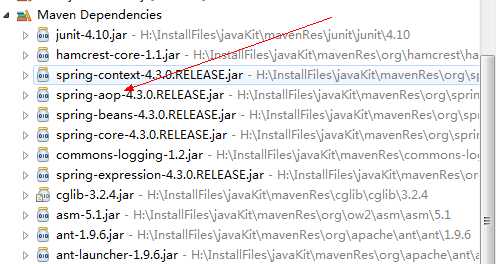
5.2、定义通知(Advice)
前置通知
1 package com.zhangguo.Spring041.aop05; 2 3 import java.lang.reflect.Method; 4 5 import org.springframework.aop.MethodBeforeAdvice; 6 7 /** 8 * 前置通知 9 */ 10 public class BeforeAdvice implements MethodBeforeAdvice { 11 12 /** 13 * method 方法信息 14 * args 参数 15 * target 被代理的目标对象 16 */ 17 public void before(Method method, Object[] args, Object target) throws Throwable { 18 System.out.println("-----------------前置通知-----------------"); 19 } 20 }
后置通知
1 package com.zhangguo.Spring041.aop05; 2 3 import java.lang.reflect.Method; 4 5 import org.springframework.aop.AfterReturningAdvice; 6 7 /** 8 * 后置通知 9 * 10 */ 11 public class AfterAdvice implements AfterReturningAdvice { 12 13 /* 14 * returnValue 返回值 15 * method 被调用的方法 16 * args 方法参数 17 * target 被代理对象 18 */ 19 public void afterReturning(Object returnValue, Method method, Object[] args, Object target) throws Throwable { 20 System.out.println("-----------------后置通知-----------------"); 21 } 22 23 }
环绕通知
1 package com.zhangguo.Spring041.aop05; 2 3 import org.aopalliance.intercept.MethodInterceptor; 4 import org.aopalliance.intercept.MethodInvocation; 5 6 /** 7 * 环绕通知 8 * 方法拦截器 9 * 10 */ 11 public class SurroundAdvice implements MethodInterceptor { 12 13 public Object invoke(MethodInvocation i) throws Throwable { 14 //前置横切逻辑 15 System.out.println("方法" + i.getMethod() + " 被调用在对象" + i.getThis() + "上,参数 " + i.getArguments()); 16 //方法调用 17 Object ret = i.proceed(); 18 //后置横切逻辑 19 System.out.println("返回值:"+ ret); 20 return ret; 21 } 22 }
5.3、创建代理工厂、设置被代理对象、添加通知。
1 package com.zhangguo.Spring041.aop05; 2 3 import org.springframework.aop.framework.ProxyFactory; 4 5 public class Test { 6 7 @org.junit.Test 8 public void test01() 9 { 10 //实例化Spring代理工厂 11 ProxyFactory factory=new ProxyFactory(); 12 //设置被代理的对象 13 factory.setTarget(new Math()); 14 //添加通知,横切逻辑 15 factory.addAdvice(new BeforeAdvice()); 16 factory.addAdvice(new AfterAdvice()); 17 factory.addAdvice(new SurroundAdvice()); 18 //从代理工厂中获得代理对象 19 IMath math=(IMath) factory.getProxy(); 20 int n1=100,n2=5; 21 math.add(n1, n2); 22 math.sub(n1, n2); 23 math.mut(n1, n2); 24 math.div(n1, n2); 25 } 26 @org.junit.Test 27 public void test02() 28 { 29 //message.message(); 30 } 31 }
运行结果:
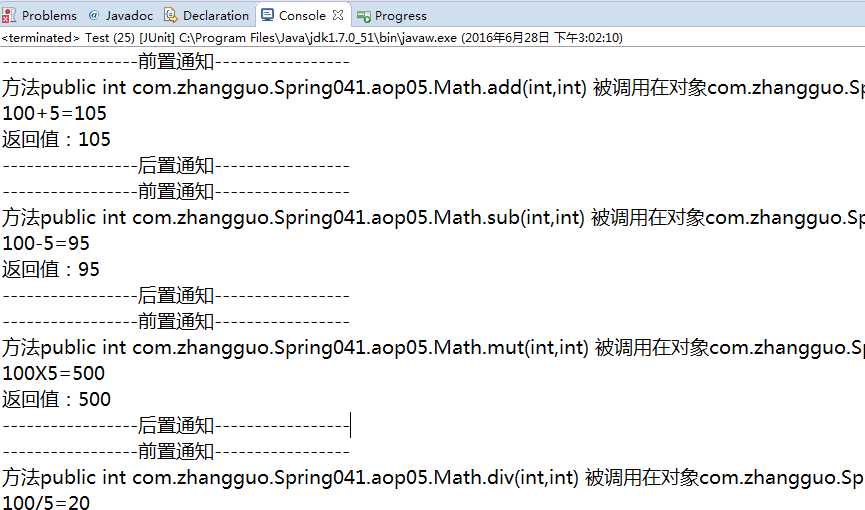
5.4、封装代理创建逻辑
在上面的示例中如果要代理不同的对象需要反复创建ProxyFactory对象,代码会冗余。同样以实现方法耗时为示例代码如下:
5.4.1、创建一个环绕通知:
1 package com.zhangguo.Spring041.aop05; 2 3 import java.util.Random; 4 5 import org.aopalliance.intercept.MethodInterceptor; 6 import org.aopalliance.intercept.MethodInvocation; 7 8 /** 9 * 用于完成计算方法执行时长的环绕通知 10 */ 11 public class TimeSpanAdvice implements MethodInterceptor { 12 13 public Object invoke(MethodInvocation invocation) throws Throwable { 14 // 被织入的横切内容,开始时间 before 15 long start = System.currentTimeMillis(); 16 lazy(); 17 18 //方法调用 19 Object result = invocation.proceed(); 20 21 // 被织入的横切内容,结束时间 22 Long span = System.currentTimeMillis() - start; 23 System.out.println("共用时:" + span); 24 25 return result; 26 } 27 28 // 模拟延时 29 public void lazy() { 30 try { 31 int n = (int) new Random().nextInt(500); 32 Thread.sleep(n); 33 } catch (InterruptedException e) { 34 e.printStackTrace(); 35 } 36 } 37 }
5.4.2、封装动态代理类
1 package com.zhangguo.Spring041.aop05; 2 3 import org.springframework.aop.framework.ProxyFactory; 4 5 /** 6 * 动态代理类 7 * 8 */ 9 public abstract class DynamicProxy { 10 /** 11 * 获得代理对象 12 * @param object 被代理的对象 13 * @return 代理对象 14 */ 15 public static Object getProxy(Object object){ 16 //实例化Spring代理工厂 17 ProxyFactory factory=new ProxyFactory(); 18 //设置被代理的对象 19 factory.setTarget(object); 20 //添加通知,横切逻辑 21 factory.addAdvice(new TimeSpanAdvice()); 22 return factory.getProxy(); 23 } 24 }
5.4.3、测试运行
1 package com.zhangguo.Spring041.aop05; 2 3 import org.springframework.aop.framework.ProxyFactory; 4 5 public class Test { 6 7 @org.junit.Test 8 public void test01() 9 { 10 //从代理工厂中获得代理对象 11 IMath math=(IMath) DynamicProxy.getProxy(new Math()); 12 int n1=100,n2=5; 13 math.add(n1, n2); 14 math.sub(n1, n2); 15 math.mut(n1, n2); 16 math.div(n1, n2); 17 } 18 @org.junit.Test 19 public void test02() 20 { 21 IMessage message=(IMessage) DynamicProxy.getProxy(new Message()); 22 message.message(); 23 } 24 }
运行结果:
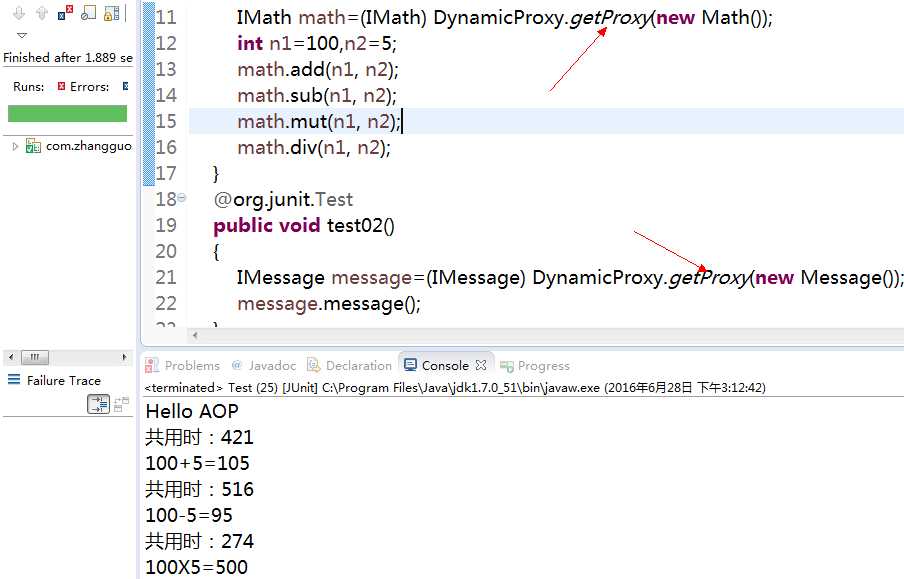
6、使用IOC配置的方式实现AOP
1、引入Spring IOC的核心jar包,方法与前面相同。
2、创建IOC的配置文件beans.xml,内容如下:
1 <?xml version="1.0" encoding="UTF-8"?> 2 <beans xmlns="http://www.springframework.org/schema/beans" 3 xmlns:xsi="http://www.w3.org/2001/XMLSchema-instance" xmlns:p="http://www.springframework.org/schema/p" 4 xsi:schemaLocation="http://www.springframework.org/schema/beans 5 http://www.springframework.org/schema/beans/spring-beans.xsd"> 6 <!-- 被代理的目标对象 --> 7 <bean id="target" class="com.zhangguo.Spring041.aop06.Math"></bean> 8 <!--通知、横切逻辑--> 9 <bean id="advice" class="com.zhangguo.Spring041.aop06.AfterAdvice"></bean> 10 <!--代理对象 --> 11 <!--interceptorNames 通知数组 --> 12 <!--p:target-ref 被代理的对象--> 13 <!--p:proxyTargetClass 被代理对象是否为一个类,如果是则使用cglib,否则使用jdk动态代理 --> 14 <bean id="proxy" class="org.springframework.aop.framework.ProxyFactoryBean" 15 p:interceptorNames="advice" 16 p:target-ref="target" 17 p:proxyTargetClass="true"></bean> 18 </beans>
3、获得代理类的实例并测试运行
1 package com.zhangguo.Spring041.aop06; 2 3 import org.springframework.context.ApplicationContext; 4 import org.springframework.context.support.ClassPathXmlApplicationContext; 5 6 public class Test { 7 8 @org.junit.Test 9 public void test01() 10 { 11 //容器 12 ApplicationContext ctx=new ClassPathXmlApplicationContext("beans.xml"); 13 //从代理工厂中获得代理对象 14 IMath math=(IMath)ctx.getBean("proxy"); 15 int n1=100,n2=5; 16 math.add(n1, n2); 17 math.sub(n1, n2); 18 math.mut(n1, n2); 19 math.div(n1, n2); 20 } 21 }
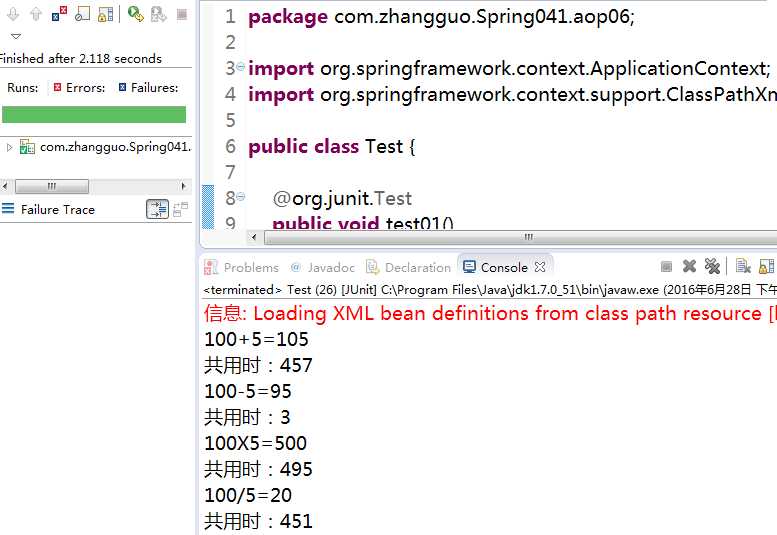
AOP、静态代理、JDK动态代理、CGLIB动态代理、Spring实现AOP、IOC+AOP
标签:
原文地址:http://www.cnblogs.com/best/p/5622779.html